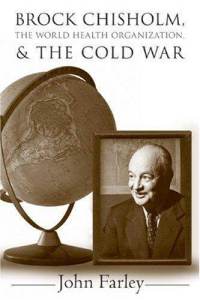Book review: Brock Chisholm, the World Health Organization, & the Cold War
by John Farley

Brock Chisholm, the World Health Organization, & the Cold War. By John Farley. Vancouver, BC: UBC Press, 2008. ISBN 978-7748-1476-8. Hardcover, 254 pages. $85.
Although an Ontarian by birth, G. Brock Chisholm has a lot in common with British Columbians, and it is only fitting that UBC Press and the BCMJ should be recording his legacy 60 years after his remarkable, sometimes stormy but always wise stewardship of the nascent World Health Organization (WHO). Chisholm’s retirement years were spent in Victoria, where he even ran briefly as a candidate in the BC provincial elections. Among his many international, political, and academic honors, he received the doctor honoris causa from UBC, where he was honorary lecturer, and was widely sought by many prestigious universities and societies in different countries for his incisive, profound, and sometimes provocative lectures that reflected his concern for man of whatever race, culture, creed, or politics in any part of the globe. Indeed it is this respectful internationality sans frontières that has marked him as an exceptional man, a world citizen, even more than a “doctor to the world,” as an earlier biographer has presented him.
Based on a mount of documents, the book is an attempt by Dalhousie University medical historian John Farley to clarify the often entangled relationships between an idealistic leader, a burgeoning organization for a new world order, and a merciless Cold War confrontation within an already little-united United Nations. Though by design limited in time and scope, the book is an insightful account of the first decade, without pretending to be a full biography of Brock Chisholm nor the full history of the WHO, but an analysis of both. Much transpires on the personality of the leader, the politics of the organization, and the postwar competition of ideologies that soon turned into bitter animosity, very considerably detracting from the objectives, performance, and efficacy of the organization. Solidly researched, with a plethora of bibliography, Brock Chisholm, the World Health Organization, & the Cold War is a valid contribution to the history of medicine, to health policy studies, and to international organizations.
The book traces Chisholm’s life from a young, decorated Canadian soldier who volunteered in both world wars to physician, psychiatrist, major-general, deputy minister of health, representative to the United Nations, and thence to the WHO. Despite this exceptional professional climb, Farley wonders with others whether “Chisholm had been a surprising choice,” yet I have found no document or statement alluding to any surprise. Being sent from Health Canada to the UN might initially seem surprising indeed, but once in the international milieu he persistently climbed by the votes of his peers, all respected experts—and potential competitors. Obviously he must have shown superior human, mental, and organizational qualities to have been repeatedly chosen for higher posts, right up to the supreme position of first director-general of the UN’s first specialized agency for health. Norman Howard-Jones, the historian of the WHO and no soft-spoken judge, is categorical about this: “he was the natural choice.” Farley also lets some doubts persist by using terms such as “visionary,” “nationalism,” or “citizenship,” that lend to vague interpretations and sometimes give the impression of an impractical man with dreamy ideas on issues such as poverty, family planning, peace, social services, health, or medical coverage. That opponents during the heat of the Cold War might have felt so and used it against him may be understandable, but these are not substantiated by documents. Yes, like most people, Chisholm had his weaknesses and hobby horses, and he did not hold the MPH degree—in an organization predominantly led by public health specialists, but he knew how to surround himself with the best experts of the time, like Stampar, Evang, Parran, Sand, and colleagues, chose his team well, and had confidence in youth. His directors of finance and publications were both aged 38 when appointed, and I recall when he officiated at my medical class graduation his passionate message to us new doctors was “safeguard your youthful vision and work health into social justice.” And as his objective was the public’s health rather than conventional public health, his being from outside the club should be seen as an advantage, as indeed it proved to be. A postscript to the book would also have shown how many Chisholmian visionary ideas have turned out to be not that illusory after all. Just two examples are the relationships between poverty and disease, and between family planning and health, for which he was, at the time, “crucified” by the American Medical Association and the Vatican. Untarnished, his worthy legacy does honor to Canada and continues, in many ways, in the WHO—arguably the most successful among the UN agencies—and in the International Association for Humanitarian Medicine (Brock Chisholm), which this reviewer is honored to have founded with Mrs Grace Chisholm and feels privileged to carry the message. This important work will be of interest to medical historians, health planners, social scientists, and government ministries. It is a vast depository of facts and documentation for politologues, students of health policy, and UN administrators. UBC Press should publish more of such books that do justice to British Columbia and to Canada.
—S. William A. Gunn, FRCSC
Switzerland
Dr Gunn was a Vancouver surgeon and lecturer in the history of medicine at UBC before joining the World Health Organization.
